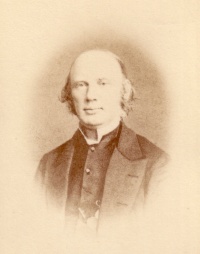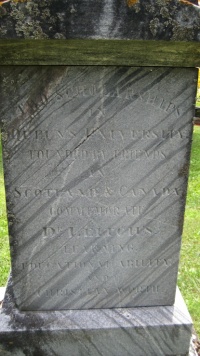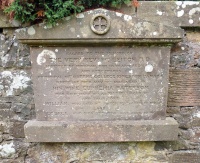William Leitch
From The Space Library
 William Leitch circa 1863 | |
| Birth Name | William Leitch |
|---|---|
| Birth Date | May 20 1814 |
| Birth Place | Rothesay Isle of Bute |
| Date of Death | May 9th 1864 |
| Place of Death | Kingston Ontario Canada |
| Occupation | Astronomer, theologian, scientist, author |
| Nationality | United Kingdom |
| Notable Works | God's Glory in the Heavens |
Contents |
Early Life
William Leitch was born in the town of Rothesay, on the Isle of Bute Scotland on May 20th 1814. His father John Leitch was a customs officer. His mother was named Margaret Sharp. After attending the local school in Rothesay William attended the Grammar School in Greenock which is located on the other side of the Clyde estuary near Port Glasgow. While studying at Greenock he was introduced to a science curriculum by the noted botanist and fossil collector Dr. Thomas Brown.
At the age of fourteen Leitch fell from the mast of a sailing vessel in Rothesay harbor and was so severely injured that he was bed-ridden for more than 18 months. His injuries left him lame for the rest of his life. During his protracted recovery he studied mathematics.
University of Glasgow
Leitch matriculated to Glasgow University in 1831 and in 1837 he received his B.A.. The following year he earned his M.A. and distinguished himself with honours in Mathematics and Science. During his time at Glasgow University he developed a keen interest in astronomy. He soon found himself working as assistant to the highly acclaimed astronomer John Pringle Nichol inside the University of Glasgow's observatory. After completing his degrees Leitch would occasionally teach Nichol's astronomy class as well as substituting for Dr William Meikleham, who was both teacher of astronomy and natural philosophy. One of the students in Nichol's and Meikleham's classes at that time was the young William Thomson, later Lord Kelvin.
Ministry Life in Fife
Leitch's first position with the church appears to have been on the other side of Scotland as assistant to the minister in Arbroath. His talents were recognised by David Leslie-Melville, 8th Earl of Leven, an up and coming figure in the Royal Navy. Melville proposed him to fill the role of Minister of Monimail, a parish situated south of Dundee in the presbytery of Cupar in Fife. Leitch settled into the role of a country minister by 1843 and within three years Leitch had found his future bride living a short two mile walk away in Cunnoquhie. Her name was Euphemia Paterson, daughter of George Paterson, and they were married in Glasgow on May 12th 1846 by Leitch's college friend Norman Macleod, minister to Queen Victoria. Over the next seven years Leitch and his wife would have four children, but two of his sons would die as infants and his wife would die in 1853 leaving him with two small children.
Scientific studies and lectures
Leitch continued to make astronomical observations while living in Monimail. In 1849 he studied the aftermath of a particularly bad thunderstorm in Monimail and conferred about it with William Thomson, now teacher of Natural Philosophy at Glasgow. In 1850 he lectured on the latest observations from Lord Rosse's giant new telescope to the people of Cupar. In 1855 he published his observations of the reproduction of insects and specifically bees which were published in the British Association for the Advancement for Science in London. In February 1855 Leitch lectured on the "Plurality of Worlds" entering into a debate raised by Sir David Brewster and William Whewell about whether life existed on other planets. The following month Leitch lectured on ballistics, the Minié rifle, artillery and the new developments in spin stabilisation of projectiles. In the summer of 1860 he studied the new comet first seen by the Baron de Marguerit. In Canada he lectured on Metaphysics and Ethics.
Canada
In 1859 Alexander Morris visiting Glasgow from Canada was introduced to Leitch by Norman Macleod as a candidate for the position of Principal of Queen's College in Kingston Ontario. He accepted the posting and on May 7th 1860 was given the degree of Doctor of Divinity by Glasgow University. He arrived in Canada in October 1860 via Quebec and was inaugurated as Principal of Queen's College on November 8th 1860. Leitch considered this first school season as a probationary period to see if he liked the job. At the time Queen's College was embroiled, along with all of the other denominational schools in Ontario, in a fight to acquire their share of the King's endowment, a vast sum of money derived from the sale of royal lands to be used specifically for establishing schools and colleges. Leitch, now representing the Presbyterians, allied himself with Dr Egerton Ryerson in Toronto. The pair, combined with representatives from other colleges, worked almost non-stop for the next four years to pry loose some of the money from the accounts of the University of Toronto. Several laws were passed by the government instructing the Senate of the U of T to share the money and despite having the support of John A. Macdonald and Alexander Campbell, both very powerful men in the government, and even after the U of T senate voted to share the money, Leitch and Ryerson were not able to implement the changes needed.
(see also William Leitch - Letters of recommendation 1859)
Space, Rocketry and Astronomy
After having spent several years working under John Pringle Nichol at Glasgow University, Leitch had become well acquainted with the night sky. Sometime in 1859 his friend Norman Macleod was invited by the publishers of Alexander Strahan of Edinburgh, to edit a new magazine called Good Words. Macleod immediately chose to include a regular column on astronomy and turned to Leitch to provide it. Beginning in January 1860 Leitch would contribute 13 essays about space. They would include:
- The Moon – Is it Inhabited?
- The Invisible Side of the Moon
- Lunar Landscape
- Discovery of the New Planet Vulcan
- The Approaching Total Eclipse of the Sun
- Comets – Their True Nature and Design
- Comets – Their History
- The Sun – Its Work and Structure
- The Structure of the Planets
- The Nebulae
- A Journey Through Space
- American Telescopes and Their Astronomers
- At Night in an Observatory
He also contributed one essay on the subject of bees (Bees and the Art of Queenmaking) and another entitled A Winter in Canada.
In all of these writings Leitch demonstrated a natural gift for explaining science. His essay A Journey Through Space included one of the earliest scientifically rooted concepts for rockets being used for space travel. In the same essay he addressed the special effects of travelling at the speed of light and how they affect the passage of time.
During a visit to Scotland in 1862 Leitch submitted a further seven essays which would be combined with his other work for publication in his forthcoming book. They were:
- The Chemistry of the Sun
- The Structure of Saturn's Rings
- Stellar Grouping
- The Observatory
- The Stability of the Solar System
- The Eternity of Matter
- The Plurality of Worlds
In the last of these he addressed the concepts of extra-terrestrial life.
His book entitled God's Glory in the Heavens was published in November 1862 by Strahan and would remain in print until at least 1877. It was available in England, Canada, the United States and Australia. Starting in 1878 extracts of the book were added to William Isbister's Half Hour Library, without attribution, including A Journey Through Space. In this format Leitch's essay was reprinted at least another seven times and apparently sold more than 500,000 copies.
During the time of writing these essays Leitch became acquainted with famed telescope manufacturer Alvan Clark of Massachusetts. He visited Clark's workshop at least twice when Clark was working on both telescopes and rifles for the Civil War. Leitch arranged for a new observatory to be built for Queen's in Kingston which was equipped with a telescope provided by Clark.
Death and Descendants
In the summer of 1863 Leitch began to suffer from illness which interfered with his work at Queen's. He had travelled to Salt Springs Nova Scotia in July to visit the Synod and from there he travelled to Truro. In February 1864 he suffered a heart attack and after attempting to rally he had to officially stop teaching on April 26th 1864. He died on May 9th 1864 of heart disease. His friends in Canada and Scotland arranged to erect a memorial at Cataraqui cemetery in Kingston. Some records report that he was buried in Scotland but he was interred in Kingston on October 4th 1864.
Leitch's two surviving children John and Moncrieffe both married. John would earn degrees at Edinburgh and St Andrews before settling into private practice in Silloth Cumberland where he raised his five daughters and one son, all who would become accomplished golfers.
John's daughter Cecilia Leitch became a champion golfer before World War I. She is remembered as one of the greatest female golfers of all time. Her fame was such that when she visited Queen's University in Canada it made the newspapers. She was once struck by lightning while out on the course and the event made headline news above the story about Charles Lindbergh about to attempt a solo crossing of the Atlantic. Cecilia's brother William Gladstone Leitch would fight in World War I. He survived the conflict but it is not known if he has any descendants. William Leitch's parish records are at St Andrews University while his granddaughter's golfing memorabilia is at St Andrews Golfing Museum.
Leitch's daughter Moncrieffe married Joseph Gordon Stuart of Fife, she died in 1913.
Also see:
- William Leitch - Eminent Men of Fife Biography 1866
- William Leitch - Extracted from Portraits of British North Americans


